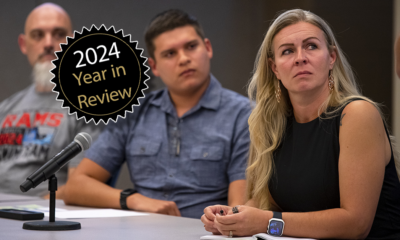Education
Project 2025: Revolutionizing the Future of Education

The ambitious proposals within the 2025 Presidential Transition Project — dubbed Project 2025 and formulated with Donald Trump in mind — envision a sweeping overhaul of the U.S. education system, spanning from early education to higher education.
The conservative Heritage Foundation is the driving force behind this comprehensive initiative, differentiating it from the Republican National Committee’s less detailed 2024 platform, although the two share certain ideological similarities.
Kevin Roberts, the president of Heritage and its lobbying arm, Heritage Action, likened Project 2025 to “a menu from the Cheesecake Factory” during an interview with USA TODAY. He stressed that no single president could implement all these proposed changes, describing the project as a “manual for conservative policy thought.”
The dynamic political climate complicates predictions about which proposals might be embraced by Trump if he were re-elected. While Trump claims unfamiliarity with the project, many of his associates contributed to its drafting. Additionally, President Joe Biden’s potential exit from the presidential race could further influence Project 2025’s trajectory. Many broad proposals in the document, such as amendments to Title I and the Individuals with Disabilities Education Act, would necessitate congressional approval, not merely executive orders.
Nevertheless, the document serves as a crucial outline of priorities for a prospective Trump administration. The Hechinger Report has developed a reference guide to delve into the educational aspects of Project 2025.
Early childhood:
Project 2025 advocates expanding child care for military families, which often set the standard for high-quality care in America. Additionally, it calls for the elimination of the Office of Head Start, leading to the closure of vital child care programs serving approximately 833,000 low-income children annually. The proposals also stress prioritizing funding for home-based child care over universal day care and incentivizing on-site child care to minimize the impact on the parent-child bond.
K-12 Education:
The project suggests major changes in data collection, urging the National Assessment of Educational Progress to include “family structure” as a category to evaluate student performance. It controversially endorses a “natural family structure” of a heterosexual, two-parent household as crucial for child development. The document also seeks to roll back protections for LGBTQ students, calling for a strict biological “binary meaning of ‘sex'” in sex discrimination laws and requiring schools to use birth certificate names and pronouns unless parents state otherwise.
Privatization is a key theme, advocating for public education funds to go directly to families, thereby supporting “education freedom.” This includes promoting education savings accounts nationwide, modeled after Arizona’s open-all policy, and exploring federal scholarship tax credits. The document also proposes scaling back federal school meal programs to only low-income families and converting special education funding to flexible block grants for states.
Higher Education:
Project 2025 aims to prosecute entities maintaining affirmative action or DEI policies and calls for “risk adjustment” methodologies in measuring graduation and earnings data. It proposes terminating the Parent PLUS loan program, citing redundancy and advocating for private alternatives. While not recommending changes to the Pell grant program, the blueprint intends to halt student loan forgiveness initiatives, shifting student loan responsibilities to the Treasury Department instead of the Education Department.
This article about Project 2025 was produced by The Hechinger Report, a nonprofit, independent news organization focused on inequality and innovation in education.


















